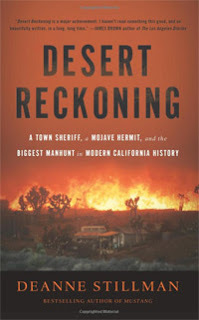Deanne Stillman talks about Desert Reckoning, cop killing, cowboys and Indians, and more


Deanne Stillman's Desert Reckoning: A Town Sheriff, a Mojave Hermit, and the Biggest Manhunt in Modern California History is knockout. Based on her Rolling Stone piece, "The Great Mohave Manhunt," which was also a finalist for a PEN Center USA journalism award, and which also is in the Best American Crime Writing of 2006, the book is about a fatal, tragic manhunt. Deanne has written for Rolling Stone, The New York Times, The Los Angeles Times, Playboy and more. She covered the Robert Blake case for Rolling Stone and the Phil Spector case for Spin and UK Independent. She also blogs for the Huffington Post and has written for TV and film, adapting her book Twentynine Palms for Tristar. She's also the prize-winning author of the plays, Pray for Surf, Star Maps and Inside the White House. I'm honored to have her here.
What I loved so much about your book is that it reads like a novel, with exquisite detail, especially with the Mojave desert. Did you yourself get to the desert?
I'm a long-time desert pilgrim and have been writing about the Mojave for years; I was in the desert when this incident happened, at the home of photographer Mark Lamonica in the Antelope Valley, and we heard the sirens - many, many, many - and Mark encouraged me to look into the story. I don't do "where's the fire" kind of reporting" -although this story does end in a giant Old Testament-style conflagration - and I was in the middle of my previous book, Mustang: The Saga of the Wild Horse in the American West. But I began to look into the story and was soon drawn in, for the above-mentioned reasons. I called my editors at Rolling Stone and asked if they'd be interested in an article. They said yes and then it all went from there. I spent two years on the magazine piece and another six on the book.
Can you talk a bit about the tragedy of these two men?
Both of them had left the city years before their fatal encounter, heading into the desert for their own reasons. The hermit wanted to be left alone and live off the grid -although he did have a family and tried to reconnect with his son, and their story is part of my book - and critical to understanding what happened. The sheriff in his own way also wanted to be left alone, but he was tethered to society in many ways. He was married, had recently adopted a son before he was killed, very popular in the area. He was available 24/7 to anyone who needed him on his dangerous desert beat. Both Kueck (the hermit) and Sorensen (the sheriff) loved the desert; both loved animals and took care of wild creatures in need. But Kueck was a Dr. Doolittle with an assault rifle; he had done time and vowed never to go back to jail. He was melting down in the desert and woe to the cop who crossed his line in the sand. Strangely, he and Sorensen had had another explosive encounter in the desert years before the final one, hence my title, Desert Reckoning. The law wanted to make Kueck a cautionary tale for others.
Why would they fear someone outside the grid so much? Why did they think one man could have so much power? Do you think America has room for sub-cultures? (I'm hoping your answer is yes) or is this a losing battle?
Well, you can't kill a cop and get away with it - or at least you're not supposed to. It's not that they thought one man had so much power; they really didn't know who or what they were up against, as Lt. Bruce Chase told me, a member of the SWAT team at the time, "it was like chasing a ghost." Throughout the week of the manhunt, they didn't see Kueck, only heard of sightings. Also they weren't trained for desert tracking; at the time the LA County Sheriff's Department was primed for urban warfare. in this part of the desert you are totally exposed; Kueck knew the desert and its ways as I recount in my book, and they didn't, that did give him a lot of power and enabled him to fend off thousands of cops and high-tech gear coming out of the Gulf War for seven days. For sure, America has room for sub-cultures. Our great wide open may be vanishing along with all who make their homes there, including plants and animals, but there are still places where you can go and plant a "Don't Tread on Me" flag or sign- as Kueck had done many moons ago.
What's obsessing you now and why?
It's a secret but I'll give you a hint: it involves cowboys and Indians and I'm going back into the frontier era when wild horses thundered across the plains...
Published on September 04, 2012 05:48
No comments have been added yet.



